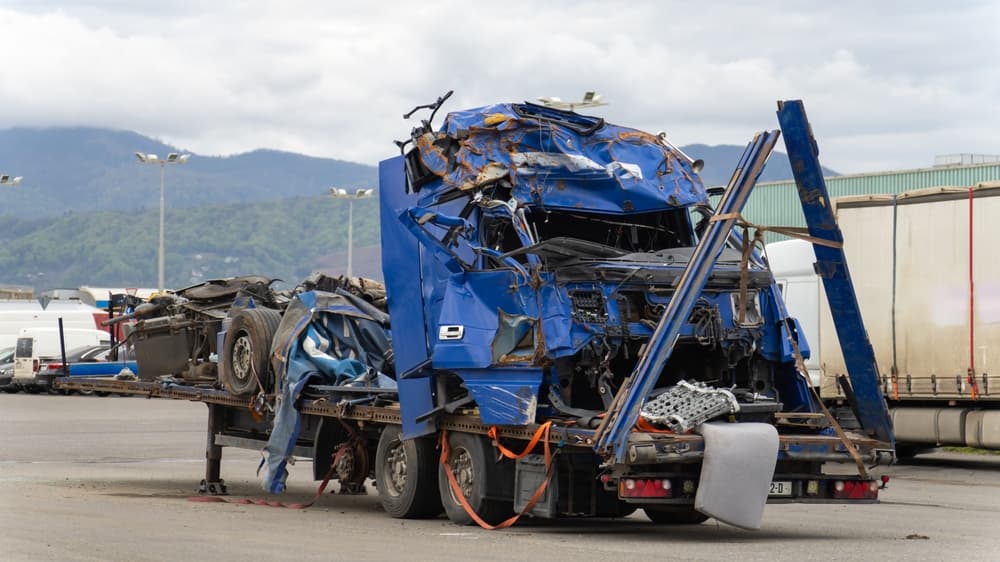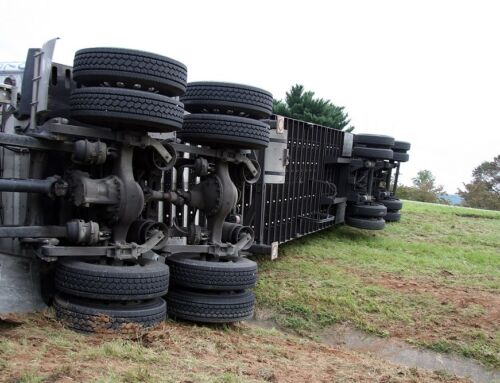A truck accident can upend your life in seconds, but the choices you make in the days that follow steer your health, finances, and legal rights for years.
Here we will look at what happens once the ambulance leaves and reality sets in. We cover legal deadlines, insurance traps, and record-keeping tips that can strengthen the foundation of any legal action you take, whether it’s an insurance claim or a truck accident lawsuit. Each step comes with practical takeaways you can complete from a hospital bed, your living room, or a rehab clinic.
Receiving a thorough medical evaluation after a truck accident is always the top priority. If you were seriously injured in the truck crash, chances are you were rushed to the ER in an ambulance and have already undergone an extensive evaluation and treatment.
When you’re able to, contact an experienced Indianapolis truck accident lawyer near you. The sooner you have an advocate fighting for your rights and the compensation you deserve, the stronger your claim may be.
Steps to Take After a Truck Accident
Your Health and Well-Being Come First

Once medical professionals have stabilized your condition, the legal and logistical aspects of the crash start to come into play.
However, if you skipped immediate care because adrenaline masked the pain or you felt normal, schedule a prompt exam with your primary doctor or an urgent-care clinic. Many serious injuries, such as concussions, traumatic brain injuries, soft-tissue tears, and internal bleeding, can hide for days before being noticed.
Other seemingly minor injuries may flare up after several days or weeks. A timely diagnosis protects both your body and your claim. Without a medical record connected to your truck accident, you have no solid ground for a personal injury claim.
Contact a truck accident lawyer
Consulting a trusted personal injury lawyer in your area with experience in settling and litigating truck accident cases should be your first move after receiving medical care.
Truck accidents differ from typical car crashes in several ways. Commercial vehicles are subject to complex federal trucking regulations, drivers often work for large companies with deep legal resources, and multiple parties may share liability. These cases require in-depth investigation, document preservation, and strategic action—often right away.
A truck accident lawyer can:
- Launch an immediate investigation
- Preserve critical evidence such as black box data, driver logs, and maintenance records
- Communicate with insurers and opposing counsel on your behalf
- Identify all parties who may be responsible
- Handle paperwork, deadlines, and negotiations
Taking legal action early is important. Many types of evidence in a truck accident case, like vehicle maintenance records or dashcam footage, may be legally destroyed after a few weeks if not secured quickly. Your lawyer can send preservation letters, subpoena records, and work with accident reconstruction experts to strengthen your case.
Truck crash victims often underestimate the long-term impact of their injuries or assume they can handle things on their own. But the trucking company and its insurer will move fast to safeguard their interests. You deserve the same protections.
Refer all communications to your lawyer

It’s not uncommon for the trucking company’s insurance adjuster to contact you within days of the crash, sometimes even before you’ve left the hospital. They move quickly for a reason: to get a hold of you before you reach out to a lawyer.
Why do they do this? Because they know that a lawyer will demand a lot more compensation for you than they’re willing to give. The insurance adjusters may seem friendly and helpful on the phone, but they are not looking out for your best interests. Their main goal is to pay you as little as possible.
Insurance adjusters have several methods to achieve this. They may offer you a quick, lowball settlement, hoping you’ll accept before understanding the full extent of your injuries or losses.
They might ask vague or leading questions aimed at shifting partial blame onto you. They may express doubt about the seriousness of your injuries, or ask for access to your medical records to “process your claim,” which can actually be used to find unrelated conditions they’ll point to instead of the accident. Some insurers even ask you to make recorded statements.
A lawyer can shield you from all of these pitfalls. After enlisting the help of an attorney near you, decline to give recorded statements, don’t sign anything, and don’t answer detailed questions. A truck accident lawyer will take over those conversations, ensure your rights are preserved, and push back against any attempt to undervalue your claim or act in bad faith.
Keep in mind that there may be multiple insurance companies involved, each with different priorities and policies. Your legal team will coordinate those communications strategically and make sure no critical detail falls through the cracks.
Attend all follow-up appointments and therapies
Recovering from a truck accident isn’t just about physical healing. It also involves restoring your quality of life and financial stability. That takes time and consistency. Sticking with your treatment plan not only supports your medical recovery, it also strengthens your injury claim by showing that you’ve taken your health seriously.
If your provider recommends physical therapy, surgery, pain management, or mental health support, follow through. Truck crash injuries can leave lasting effects that aren’t immediately obvious.
The insurance company will be looking for signs that you’re exaggerating your injuries or that they worsened because you didn’t comply with your prescribed treatment. Consistency tells the story of your recovery more effectively than any single document.
If something in your care plan doesn’t feel right, talk to your doctor. Seek second opinions when needed. Your attorney can also connect you with trusted providers who have experience treating accident victims.
Document your injuries and experiences
Truck accident claims rely heavily on documentation. The more detailed your records are, the easier it is to present a compelling case. Here are a few things you should begin compiling as soon as you’re able:
- A written or video journal that consistently captures your symptoms, pain levels, progress, and emotional changes can support your claims for pain and suffering. Your legal team will use this evidence to demonstrate how the truck crash changed your daily life and what you’ll need to recover fully.
- Medical records and receipts from every provider
- Lost wages documentation from your employer, including time off and reduced hours
- Property damage reports for your vehicle or other affected items
- Any physical evidence that was with you at the time of the crash
Even minor details can add depth and credibility to your claim. Keeping this material organized will save you time and help your legal team build the strongest possible case.
Avoid posting about the accident on social media

In the digital age, it’s tempting to share updates with friends and family online. However, social media can harm your claim more than you might think. Insurance companies often monitor your posts and may take screenshots to use as evidence. A photo of you smiling or a casual comment could be interpreted as proof you’re not as injured as you claim.
Adjust your privacy settings and avoid discussing the crash, your injuries, or your legal case on platforms like Facebook, Instagram, and Twitter. If you’re unsure whether something is appropriate to post, check with your lawyer first.
Don’t rush to settle your case
It’s not unusual to receive a settlement offer within weeks of the accident. These early offers might sound appealing, especially if medical bills and missed paychecks are adding pressure. But in most cases, these offers are far lower than what the case is truly worth.
Truck accident cases often involve serious injuries, long recovery periods, and potential future medical needs. If you accept a settlement before you’ve fully healed—or before you know the full extent of your damages—you could be left paying for expenses down the line.
A truck accident lawyer can evaluate the offer, calculate current and future losses, and negotiate for the compensation you actually deserve. This includes:
- Medical expenses (past and future)
- Lost income and reduced earning capacity
- Pain and suffering
- Mental and emotional distress
- Permanent disability or disfigurement
- Loss of enjoyment of life
Your legal team may also uncover additional sources of compensation by identifying other liable parties or violations of safety regulations.
Stay in regular contact with your legal team
One of the most effective things you can do during your recovery is to keep your legal team informed. Updates about your medical condition, new expenses, or changes in your ability to work can all influence the direction of your case. Even if it seems minor, sharing these details helps your lawyer stay ahead of the defense and craft a well-supported claim.
Your attorney may also need your signature on documents, help collecting evidence, or input on settlement discussions. Prompt responses can help keep your case moving forward efficiently.
Most personal injury firms work on a contingency fee basis, which means you don’t owe legal fees unless they secure a recovery on your behalf. You can rely on their guidance without worrying about out-of-pocket costs.
Be mindful of legal deadlines
Every state has a statute of limitations for personal injury claims. If you wait too long to take legal action, you could lose your right to compensation entirely, even if the facts are on your side.
Most states give you two or three years from the date of the accident to file a claim, but the rules vary. In Indiana, for example, the statute of limitations for personal injury is two years from the date of the accident. However, exceptions can apply. If a government entity is involved, you may have even less time to file a notice of claim.
Your truck accident lawyer will monitor these deadlines and make sure no opportunities are missed. The earlier you hire an attorney, the more time they have to gather evidence and build a compelling case.
How Compensation Is Calculated After a Truck Accident

One of the most common questions people have is: How much is my case worth? The answer depends on several factors, including:
- The severity of your injuries
- Your total medical expenses
- Lost wages
- Diminished future earning potential
- Pain and suffering
- Emotional trauma
- Whether you’ll need ongoing care or accommodations
- Impact on your quality of life
In some truck accident cases, punitive damages may also be awarded if the driver or company acted with extreme negligence; for example, knowingly allowing a driver with a history of DUIs to operate a vehicle.
There is no universal formula for determining the value of a truck accident claim. A truck accident lawyer will analyze every aspect of your case, including liability, damages, and available insurance coverage, to estimate what a fair settlement should look like.
Your Next Step Matters
Truck accidents can have a ripple effect on every area of your life—your health, your income, your family, and your future. The hours and days after the crash are filled with medical appointments, paperwork, and stress. But you don’t have to shoulder the legal burden on top of it all. Knowing what to do after a truck accident and having the right team in your corner makes all the difference.
Contact a Truck Accident Lawyer Who Can Help You Move Forward
If you’ve been injured in a truck accident in the Indianapolis area, you don’t need to sort through the legal system on your own. At Hurst Limontes, our Indianapolis personal injury attorneys have over a century of combined experience helping injured individuals hold negligent truck drivers and companies accountable. We understand how high the stakes are, and we take that responsibility to heart.
We’ll handle every aspect of your case, from investigating the crash and preserving evidence to negotiating with insurers and preparing for trial if necessary. You’ll always be treated with respect, care, and attention. Our No Fee Promise means you don’t pay us unless we win.
Call us today at (317) 636-0808 or use our contact form for a free consultation. Let us start fighting for the compensation and peace of mind you deserve.





